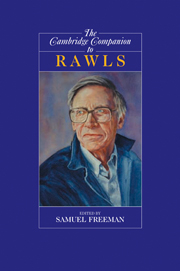Book contents
- Frontmatter
- Introduction
- 1 Rawls and Liberalism
- 2 For a Democratic Society
- 3 Rawls on Justification
- 4 Rawls on the Relationship between Liberalism and Democracy
- 5 Difference Principles
- 6 Democratic Equality
- 7 Congruence and the Good of Justice
- 8 On Rawls and Political Liberalism
- 9 Constructivism in Rawls and Kant
- 10 Public Reason
- 11 Rawls on Constitutionalism and Constitutional Law
- 12 Rawls and Utilitarianism
- 13 Rawls and Communitarianism
- 14 Rawls and Feminism
- Bibliography
- Index
14 - Rawls and Feminism
Published online by Cambridge University Press: 28 May 2006
- Frontmatter
- Introduction
- 1 Rawls and Liberalism
- 2 For a Democratic Society
- 3 Rawls on Justification
- 4 Rawls on the Relationship between Liberalism and Democracy
- 5 Difference Principles
- 6 Democratic Equality
- 7 Congruence and the Good of Justice
- 8 On Rawls and Political Liberalism
- 9 Constructivism in Rawls and Kant
- 10 Public Reason
- 11 Rawls on Constitutionalism and Constitutional Law
- 12 Rawls and Utilitarianism
- 13 Rawls and Communitarianism
- 14 Rawls and Feminism
- Bibliography
- Index
Summary
Because John Rawls's work on justice has such fundamental importance, feminists have scrutinized it with particular care and have made many criticisms. Rawls himself has become deeply concerned with these criticisms – in some cases seriously revising his theory in response. In general, he continues to insist, the various feminist objections do not invalidate a liberal approach to the theory of justice: in fact, liberal theories can answer feminist concerns better than other theories. Nor, he believes, is his particular liberal theory wanting: he doubts that it could be shown that justice as fairness does not have the resources to deal with the problems raised by the women's movement. Nonetheless, he concedes, liberal theories of justice have a great deal of work yet to do if they are to make good on this promise, particularly in the area of family justice:
Except for the great John Stuart Mill, one serious fault of writers in the liberal line is that until recently none have discussed in any detail the urgent questions of the justice of the family, the equal justice of women and how these things are to be achieved. Susan Okin’s contentions about this in Justice, Gender and the Family cannot be denied. Liberal writers who are men should, with whatever grace they can muster, plead nolo contendere to her complaints. (MS, 1994)
- Type
- Chapter
- Information
- The Cambridge Companion to Rawls , pp. 488 - 520Publisher: Cambridge University PressPrint publication year: 2002
- 14
- Cited by



